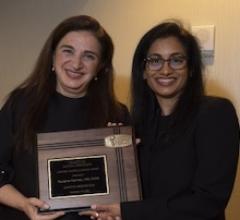
November 22, 2019 — Artificial intelligence can examine electrocardiogram (ECG) test results, a common medical test, to pinpoint patients at higher risk of developing a potentially dangerous irregular heartbeat (arrhythmia) or of dying within the next year, according to two preliminary studies to presented at the American Heart Association’s Scientific Sessions 2019 — November 16-18 in Philadelphia.
Researchers used more than 2 million ECG results from more than three decades of archived medical records in Pennsylvania/New Jersey’s Geisinger Health System to train deep neural networks — advanced, multi-layered computational structures. Both studies, from the same group of researchers, are among the first to use artificial intelligence to predict future events from an ECG rather than to detect current health problems, the scientists noted.
“This is exciting and provides more evidence that we are on the verge of a revolution in medicine where computers will be working alongside physicians to improve patient care,” said Brandon Fornwalt, M.D., Ph.D., senior author on both studies and associate professor and chair of the Department of Imaging Science and Innovation at Geisinger in Danville, Penn.
A deep neural network for predicting incident atrial fibrillation directly from 12-lead electrocardiogram traces (Poster Presentation MDP106)
Researchers speculated that a deep learning model could predict irregular heart rhythms, known as atrial fibrillation (AF), before it develops. Atrial fibrillation is associated with higher risk of stroke and heart attack. Focusing on 1.1 million ECGs that did not indicate the presence of AF in more than 237,000 patients, researchers used highly specialized computational hardware to train a deep neural network to analyze 15 segments of data — 30,000 data points — for each ECG.
The researchers found that within the top 1 percent of high-risk patients, as predicted by the neural network, 1 out of every 3 people was diagnosed with AF within a year. The model predictions also demonstrated longer term prognostic significance as the patients predicted to develop AF at 1-year had a 45 percent higher hazard rate in developing AF over 25-year follow-up than the other patients.
“Currently, there are limited methods to identify which patients will develop AF within the next year, which is why, many times, the first sign of AF is a stroke,” said senior author Christopher Haggerty, Ph.D., assistant professor in the Department of Imaging Science and Innovation at Geisinger. “We hope that this model can be used to identify patients with atrial fibrillation very early so they can be treated to prevent stroke.”
Jennifer Hall, Ph.D., the American Heart Association Chief of the Institute for Precision Cardiovascular Medicine, noted deep learning is “terrific as another way for us in our field of cardiovascular medicine to be able to help patients and help those understand the risk of stroke.”
“Being able to understand who is at risk for having irregular heartbeats or atrial fibrillation then helps us understand who may be at risk of also having a stroke and then treating these individuals and preventing both atrial fibrillation and perhaps a stroke down the road,” Hall said. “Having these techniques at our fingertips and having more precise techniques to uncover potential atrial fibrillation now or in the future, is absolutely tremendous.”
Deep neural networks can predict one-year mortality directly from ECG signal even when clinically interpreted as normal (Oral Presentation 119)
To help identify patients most likely to die of any cause within a year, Geisinger researchers analyzed the results of 1.77 million ECGs and other records from almost 400,000 patients. The team used this data to compare machine learning-based models that either directly analyzed the raw ECG signals or relied on aggregated human-derived measures (standard ECG features typically recorded by a cardiologist) and commonly diagnosed disease patterns.
The neural network model that directly analyzed the ECG signals was found to be superior for predicting 1-year risk of death. Surprisingly, the neural network was able to accurately predict risk of death even in patients deemed by a physician to have a normal ECG. Three cardiologists separately reviewed the ECGs that had first been read as normal, and they were generally unable to recognize the risk patterns that the neural network detected, researchers said. “This is the most important finding of this study,” said Fornwalt, who co-directs Geisinger’s Cardiac Imaging Technology Lab with Haggerty. “This could completely alter the way we interpret ECGs in the future.”
While the vast Geisinger database is a key strength of both studies, the findings should be tested at sites outside of Geisinger, the researchers noted. “Incorporating these models into routine ECG analysis would be simple. However, developing appropriate care plans for patients based on computer predictions would be a bigger challenge,” said lead author Sushravya Raghunath, Ph.D. Researchers are now testing whether the predictions can be used to improve health outcomes.


 November 14, 2025
November 14, 2025 









